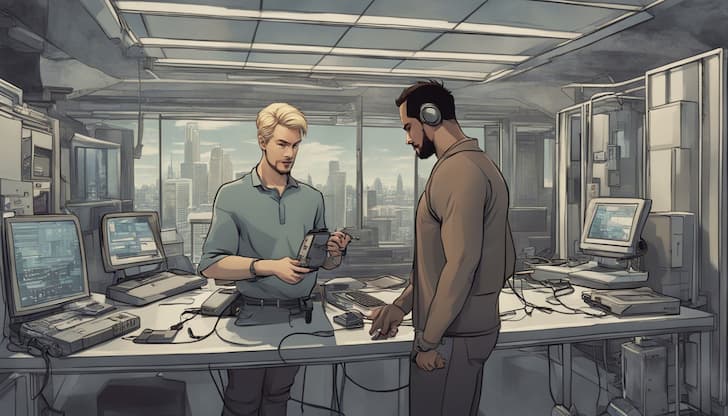Remote work has created one of the most fascinating contradictions of modern urban life. You live in a city of millions, surrounded by endless opportunities for human connection, yet your workday unfolds entirely within the digital realm. Your colleagues exist as voices through headphones and faces on screens while real people walk past your window every minute.
The metropolis becomes both your backdrop and your isolation chamber, a place where physical proximity coexists with professional distance in ways that would have seemed impossible just decades ago.

This contradiction goes deeper than simple irony. Cities were built on the premise of bringing people together - markets, offices, factories, all designed around the magnetic pull of human collaboration. Now you sit in your apartment overlooking busy streets, conducting meetings with people who might live three time zones away while ignoring the neighbor who shares your building's WiFi network.
The Illusion of Urban Energy
Living in a metropolis while working remotely creates a peculiar form of borrowed energy. You absorb the city's rhythm through your windows - the morning rush, the afternoon lull, the evening wind-down - without actually participating in it. The urban pulse becomes your workday soundtrack, a constant reminder of collective motion happening just beyond your home office walls. Your productivity feeds off this ambient energy while remaining completely disconnected from its source.
This borrowed vitality has unexpected psychological effects. The city's energy tricks your brain into feeling socially connected even during solo work sessions that stretch for hours. Sirens outside your window substitute for office chatter, and the view of busy sidewalks replaces the visual stimulation of colleagues walking past your desk.
Remote workers often position their desks to overlook busy urban streets, turning city life into background entertainment during video calls. You find yourself watching pedestrians navigate crosswalks while listening to quarterly reports, or observing delivery drivers double-park while reviewing spreadsheets. The constant human drama outside your window creates visual stimulation that prevents the brain fog common to isolated remote work.
Coffee Shop Tactics
- Freelancers flood metropolitan coffee shops to hijack the social energy of strangers
- You plant yourself at a small table surrounded by animated conversations while typing Slack messages to teammates in different countries
- The barista knows your order and regulars recognize your face, creating micro-relationships that substitute for workplace connections
- Your "office" becomes a rotating cast of locals whose lives you observe while conducting business with people whose environments remain unknown
The Geography of Digital Relationships
Your remote work relationships exist in a geography of screens and time zones rather than neighborhoods and commute routes. Colleagues become associated with their virtual backgrounds, their video call lighting, and the quality of their internet connection rather than their choice of lunch spots or their preferred elevator small talk. The person you collaborate with most closely might live in a completely different climate, yet you know more about their home office setup than your next-door neighbor's profession.
This digital geography creates intimacy through pixels rather than proximity. You witness your teammates' personal lives through glimpses of their living spaces during video calls - their bookshelves, their pets, their family members walking through the background. These accidental revelations build relationships in ways that traditional office interactions rarely allowed.

Professional relationships develop through shared digital spaces that exist nowhere and everywhere simultaneously. Your team's Slack workspace becomes more familiar than your apartment building's common areas. The virtual conference room where you hold weekly meetings feels more like home than the actual conference rooms in office buildings throughout your city.
Home Office Intimacy
- Remote work strips away professional facades, replacing them with unfiltered peeks into personal spaces
- You learn about your manager's taste in art from paintings visible during video calls
- Your coworker's kitchen becomes familiar territory as they grab coffee between meetings
- These involuntary home tours create bonds built on domestic vulnerability rather than professional competence
The Metropolitan FOMO Effect
Living in a city while working remotely creates a unique form of professional FOMO - you're surrounded by networking events, industry meetups, and career opportunities that you're aware of but don't participate in because your professional life exists elsewhere. Your Twitter feed fills with photos from conferences happening blocks away from your apartment while you attend virtual industry events with people scattered across continents. The metropolitan professional scene happens around you without including you, creating a peculiar form of social displacement.
This urban career disconnect becomes especially pronounced during business hours. While your city neighbors rush to office buildings for important meetings, you conduct equally important meetings from your bedroom while wearing pajama pants. The professional energy of your metropolis flows past your windows without touching your actual work life.
The visual reminders of urban professional life create a constant low-level anxiety about missed opportunities. Every suited figure walking past your window represents a potential networking connection that you'll never make because your career unfolds in digital spaces. Coworking spaces attempt to bridge this gap, but they often feel like expensive solutions to problems that previous generations never had to solve.
Lunch Hour Reality
- The traditional lunch hour becomes strange when you work remotely in a busy city
- Urban professionals flood restaurants while you eat alone at your kitchen counter scrolling messages from colleagues also eating alone
- The social ritual of lunch breaks disappears, replaced by eating while watching others socialize through your window
- Your lunch companions exist in group chats rather than sharing physical tables
The Neighborhood Office Ecosystem

Remote work has spawned an entire ecosystem of urban spaces designed to recreate office environments for people who don't have offices. Coffee shops install more outlets and advertise WiFi speeds, coworking spaces multiply like urban mushrooms, and libraries become inadvertent business centers filled with people taking hushed conference calls between the stacks. Your neighborhood transforms into a distributed office building where every public space becomes a potential workplace.
This transformation changes the social dynamics of urban spaces in unexpected ways. The coffee shop that used to be a social gathering place becomes a silent workspace where conversation disrupts productivity. Library study areas fill with remote workers whose phone calls violate traditional quiet expectations. Park benches become outdoor offices for people seeking better lighting for video calls.
Local businesses develop new revenue streams by catering to remote workers who need professional spaces without professional leases. Restaurants offer "work-friendly" hours with unlimited coffee refills and laptop-friendly table configurations. Hotels market day-use rates for remote workers who need quiet spaces for important calls. The urban service economy pivots to support a professional class that works from home but occasionally needs to work from somewhere that feels more official.
Space Adaptations
- Coworking spaces multiply as remote workers seek to recreate social elements of traditional offices
- Public libraries become business centers where whispered phone calls about quarterly reports mix with research activities
- Restaurants pivot to offer work-friendly hours with unlimited coffee and laptop-friendly tables
- Hotels market day-use rates for remote workers needing quiet spaces for important calls
The Social Architecture of Isolation
Remote work in metropolitan areas creates a new form of urban loneliness - surrounded by people but professionally isolated from all of them. Your strongest work relationships exist with people whose local coffee shops, weather patterns, and commute struggles you'll never experience. Meanwhile, the humans who share your actual environment, breathe your air, and navigate your streets remain professional strangers. This inverts the traditional relationship between geography and social connection.
The architecture of cities was designed to facilitate chance encounters and organic relationship building through shared spaces and common destinations. Remote work circumvents this entire system, creating professional relationships that develop without any physical foundation. You might spend years collaborating closely with someone whose voice you know intimately but whose height remains a mystery.
This professional isolation happens within a context of urban social abundance, making it particularly disorienting. The city offers endless opportunities for human connection - clubs, classes, volunteer organizations, hobby groups - but none of these address the specific social needs that work traditionally fulfilled. Professional identity becomes untethered from geographical identity, creating a sense of existing in two separate worlds simultaneously.
Digital Social Attempts
- Remote teams create dedicated Slack channels for non-work conversation, but digital water coolers feel forced
- You schedule informal video calls to simulate casual conversations that used to happen naturally
- These digital social spaces require intentionality that traditional workplace relationships never demanded
- Professional friendship starts feeling more like professional networking than organic connection
The paradox of working online while living in a metropolis reveals how fundamentally remote work has disrupted traditional relationships between place, productivity, and professional identity. You exist simultaneously as an urban dweller and a digital nomad without ever leaving your neighborhood. The city provides the energy and infrastructure that make your remote work possible while remaining largely irrelevant to your actual professional relationships and daily responsibilities.
This contradiction will likely define urban life for generations as remote work becomes permanently embedded in professional culture. Cities must reimagine their role as centers of commerce and collaboration when much of that commerce and collaboration happens in virtual spaces accessible from anywhere with decent internet. Meanwhile, remote workers must create new forms of professional community that bridge the gap between digital relationships and the human need for shared physical experiences.
How I "Finally" Make Over $7,000 Monthly Income
"The most valuable thing I've ever done!"
